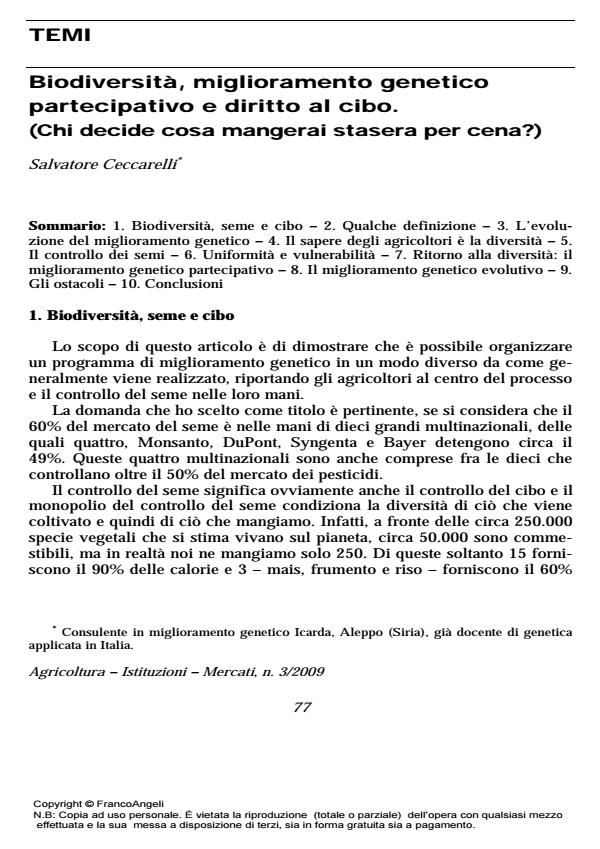Biodiversity, Participatory Plant Breeding Programs and Right to Food. (Who Decides what You’re Going to Eat for Dinner this Evening?)
Journal title AGRICOLTURA ISTITUZIONI MERCATI
Author/s Salvatore Ceccarelli
Publishing Year 2011 Issue 2009/3
Language Italian Pages 14 P. 77-90 File size 103 KB
DOI 10.3280/AIM2009-003004
DOI is like a bar code for intellectual property: to have more infomation
click here
Below, you can see the article first page
If you want to buy this article in PDF format, you can do it, following the instructions to buy download credits

FrancoAngeli is member of Publishers International Linking Association, Inc (PILA), a not-for-profit association which run the CrossRef service enabling links to and from online scholarly content.
The paper addresses the issue of seed and food diversity, and consequently of food security at global level. As plant breeding evolved from being done by farmers for thousands of years to become almost completely private, there has been a shift from a large agro biodiversity (farmers were breeding for their uses and their environment) to a dangerous uniformity. Today 60% of the calories in the human diet come from just three crops, maize, rice and wheat. With nearly 50% of the seed market in the hands of only four companies also the diversity within these three crops is limited. The uniformity between and within crops makes us vulnerable to new pests and diseases which can spread easily and to climate changes, which are now unequivocal and already have adverse effects on food production and food quality. Climate changes are also expected to cause losses of biodiversity, particularly in marginal environments. Participatory plant breeding (Ppb) is advocated as better than conventional plant breeding (Cpb) not only because of its higher effectiveness in marginal environments, speedy development and deployment of new varieties, but particularly for its ability to increase both spatial and temporal biodiversity. Gender-sensitive Ppb has also proven suitable to target the most marginalized farmers and empower them to safeguard both their interests and agro biodiversity. An important aspect of Ppb is that the control of seed production is taken back in the hands of the farmers who with the expertise acquired through their participation in the PPB programs can now handle evolutionary populations, large mixtures of genotypes that continue to evolve in the hands of the farmers producing continuously better adapted genotypes. The paper shows that by operating a synthesis between the knowledge of the scientists and the knowledge of the farmers in participatory plant breeding programs, it will be possible to produce a range of varieties to fit the multitude of environments surrounding us, capable of making farmers less dependent from external inputs and less vulnerable to diseases, pests and climate changes and eventually contribute to the food security of all.
Keywords: Climate Changes, Biodiversity, Participatory Plant Breeding, Local Knowledge, Food Security
Salvatore Ceccarelli, Biodiversità, miglioramento genetico partecipativo e diritto al cibo. (Chi decide cosa mangerai stasera per cena?) in "AGRICOLTURA ISTITUZIONI MERCATI " 3/2009, pp 77-90, DOI: 10.3280/AIM2009-003004